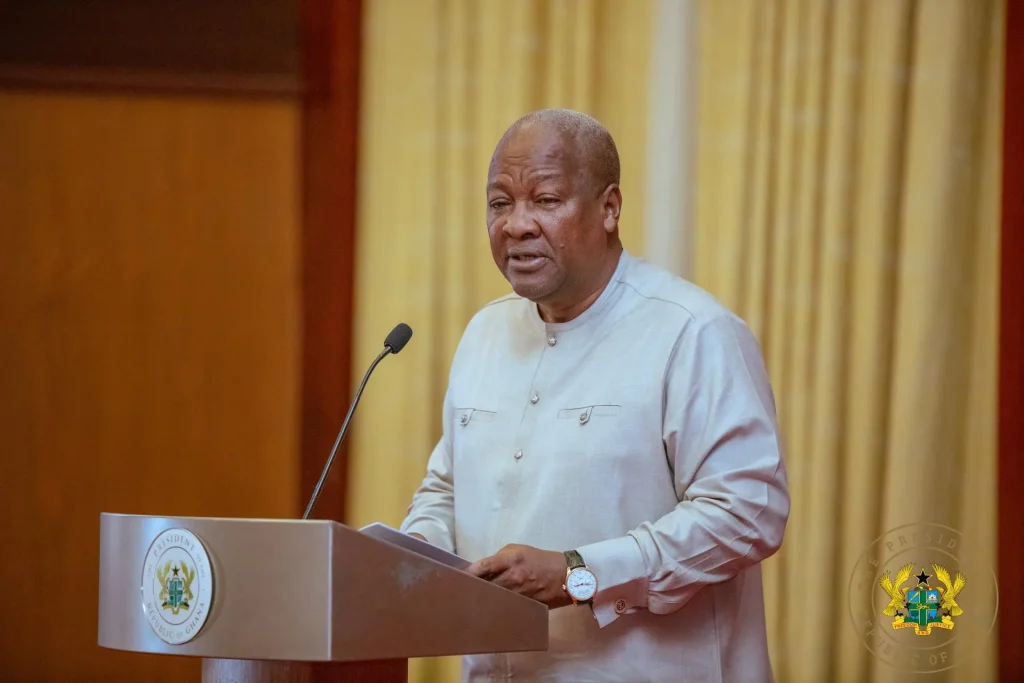President John Dramani Mahama has clarified why the COVID-19 levy remains in place, despite earlier promises to abolish it.
The pledge to scrap the levy was a key part of his 120-day social contract with Ghanaians, as captured in the National Democratic Congress’ 2024 manifesto.
In a televised address on May 7 to mark his administration’s first 120 days, the President explained that while three out of four promised tax repeals have been delivered, the COVID-19 levy remains due to its ties to Ghana’s ongoing IMF programme.
“On April 2nd, I signed several bills into law, including the Electronic Transfer Levy—E-Levy Repeal Bill 2025, the Emissions Levy Repeal Bill and the Betting Tax. We have delivered on three of the four specific tax repeals as promised,” he said.
“The COVID levy has intricate linkages to the existing IMF programme. As a value-added tax, we have agreed with our multilateral partners to include it in our overall VAT rationalization exercise scheduled for September of this year.”
The President further outlined the government’s broader achievements in tax policy and financial reform, citing the passage of several major fiscal bills.
“We have significantly exceeded our 120-day promises regarding overall tax reform by enacting other critical bills, such as the Value Added Tax (Amendment) Bill, Income Tax Amendment Bill, the removal of VAT on motor vehicles, the Public Financial Management Bill, the Growth and Sustainability Levy Act, the Earmarked Funds Capping and Realignment Bill, the Gold Board Bill, the Energy Sector Levy Bill, and the Petroleum Revenue Amendment Bill,” he added.
President Mahama reaffirmed his administration’s commitment to delivering on its promises.
“We made promises and we have delivered them,” he stated.
He highlighted the swift formation of his ministerial team as part of that delivery. “As promised, I compiled the list of my ministers within the first 14 days of my administration. They have since been vetted and have hit the ground running,” he said.
Pointing to efforts to reduce the size of government, he said, “I have appointed only 56 ministers and deputies so far – the smallest number of ministers and deputies appointed by any government in the Fourth Republic. We have also nominated Metropolitan, Municipal, and District Chief Executives, and they are going through various phases of confirmation to complete the formation of our governance team at the local level.”
The President also spoke about a revised Code of Conduct for public officials aimed at curbing abuse and promoting integrity in public office.
“Building on my previous efforts, we have reworked and finalised a significantly improved version of the Code of Conduct for government appointees. This comprehensive document, launched last Monday, addresses new areas, including a prohibition on purchasing state property directly or indirectly, regulations regarding hampers, and clear monetary limits for official gigs. I have left my appointees in no doubt that I will bring down the hammer swiftly and strongly if they breach any of its provisions,” he said.
On economic policy, the President noted the positive impact of recommendations made during the National Economic Dialogue, including progress in currency stability and fiscal restraint.
“The implementation of these recommendations has begun to yield results. The currency is becoming fairly stable, inflation is inching downward, and we have reduced the excessive borrowing that had become the trademark of past governments. The report also provided valuable advice on promoting industrialised agriculture and aligning skills development with national priorities. We have taken this advice seriously, and implementation is underway, guiding our economic policy decisions,” he explained.
He concluded with an update on fiscal reforms aimed at curbing national debt and improving long-term stability.
“Following the recommendations of the Dialogue, we have amended the Public Financial Management Act 2016 (Act 921) to introduce a debt rule that aims to reduce the ratio to 45% by 2034. We have also established an operational rule to post an annual primary surplus of at least 1.5% of GDP on a commitment basis. The amendment also allows for the establishment of an independent fiscal council to monitor the government’s adherence to the fiscal rules. This reform was executed in April 2025, before the September 2025 deadline under the IMF-supported Programme.”


